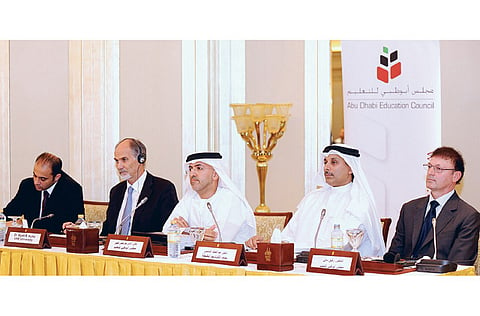Education Council launches strategic plan for higher studies
Ten-year initiative aims to raise quality of learning in abu dhabi

Abu Dhabi: With the aim of providing 75 per cent job placements within six months of graduation, the Abu Dhabi Education Council (Adec) has invested in a ten-year strategic plan to help raise the quality of higher education for students in the nation's capital.
The aggressive plan is meant to put the quality of higher education on a par with international standards, while aligning academic programmes with Abu Dhabi's 2030 vision. It will also foster a much needed research and development (R&D) practice in Abu Dhabi to drive an innovation-based economy.
Some of the current challenges identified by a carefully selected higher education task force among universities in the capital include the misalignment of higher education output with Abu Dhabi's socio-economic vision; insufficient quality of graduates and faculty; limited research activity; and restricted opportunities and access to quality of higher education. With the aim of exceeding a 90 per cent employer satisfaction rate by 2018, the Adec will review existing and new universities, through inspections and a monitoring system among all universities by 2011.
Dr Mugheer Al Khaili, Director-General of the Adec, explained that most of these challenges are a result of low preparation in primary and secondary schools (P-12), inadequate quality assurance, limited and unfocused programme offerings, difficulty in attracting and retaining quality faculty, insufficient funding for higher education and underdeveloped research and innovation environment.
"We need to carefully align higher education with labour market and socio-economic needs, guided by the Abu Dhabi Economic Vision 2030, and Abu Dhabi's policy agenda," said Al Khaili. According to Rafik Al Makki, Executive Director, Office of Planning and Strategic Affairs at the Adec, the labour market currently requires 28 per cent of graduates across the emirate, whereas only nine per cent are currently enrolled.
"Even though 64 per cent of Abu Dhabi's GDP is based on oil and gas, only four per cent of university graduates are employed in that sector, and that's because our universities are mostly teaching university's, only a few offer a PhD programme, or a graduate degree," said Makki, adding that a knowledge-based society requires proper infrastructure and more scientists.
With the aim of providing education for everyone, part of the ten-year strategy plan includes special needs infrastructure in 100 per cent of universities across the Emirate, and to increase the number of adult learners over 25 years of age by at least 35 per cent.
Higher education
- 63: Total number of public and private universities across the UAE.
- 34,000: Total number of students in higher education (70 per cent of which are federal universities).
- 24: Total number of public and private universities across the Emirate of Abu Dhabi.
- Three: Public universities (Higher Colleges of Technology, UAE University, Zayed University).
- Three: Private and public (charges fees) — (Khalifa University and Abu Dhabi University)
Source: ADEC


